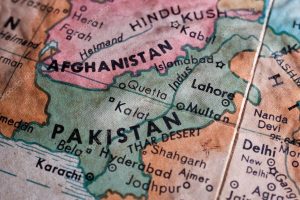“The Islamic Emirate is trying its best to ensure that the territory of Afghanistan is not used against Pakistan or any other country,” Taliban spokesman Zabihullah Mujahid said Tuesday, in response to remarks made earlier in the week by Pakistani Defense Minister Khawaja Asif that Afghan soil was “being used for cross-border terrorism.”
Asif’s comments came in the wake of increased attacks claimed by Tehreek-e-Taliban Pakistan (TTP, also referred to as the Pakistani Taliban) following the November 2022 breakdown of a ceasefire brokered by the Afghan Taliban government.
Soon after, the TTP threatened attacks on Pakistan’s political leaders — specifically the two parties currently ruling Pakistan in coalition, the Pakistan Muslim League-Nawaz (PML-N) and the Pakistan Peoples Party (PPP) — for supposedly appeasing the United States with attacks on the TTP.
Formed in 2007, the TTP shares ideological roots with the Afghan Taliban, and during the Taliban’s 20-year war with international forces and the former Republic government in Kabul the two groups provided mutual support to each other. The Afghan Taliban sought refuge in Pakistani territory; the Pakistani Taliban sought refuge in Afghan territory. The TTP’s ire has long been directed toward Pakistani authorities, particularly in the erstwhile Federally Administered Tribal Areas (FATA), which were merged with Khyber Pakhtunkhwa in 2018. Noor Wali Mehsud has led the group since 2018, taking over following the death of his predecessor, Mullah Fazlullah, in a U.S. drone strike in Kunar, Afghanistan.
When the Afghan Taliban came to power in August 2021, Pakistani authorities hoped the group would be able to help rein in the TTP. Kabul reportedly facilitated talks between TTP leaders and Pakistani officials, but the Pakistan government denied the talks until after the TTP declared a unilateral ceasefire in June 2022. There were few hopes that the ceasefire would solidify into permanent peace.
The TTP claimed responsibility for a November 16 attack that killed six police on patrol in Lakki Marwat, about 125 miles southwest of Peshawar. Later that month, the group told its fighters that “it is imperative for you to carry out attacks wherever you can in the entire country.” The ceasefire was over.
Islamabad again turned to pressuring the Afghan Taliban to take action against the TTP, but also said it would move against the group. On January 2, Pakistan’s National Security Committee reiterated its resolve to have “zero tolerance for terrorism” in Pakistan and “reaffirmed its determination to take on any and all entities that resort to violence.” As reported by VOA, at the end of a lengthy meeting of the NSC, which Prime Minister Shehbaz Sharif and Army Chief General Asim Munir attended, the body “vowed that no nation will be allowed to shelter militants who stage attacks against the country.” The reference was clearly to Afghanistan.
Then in an interview with Geo News TV that evening, Pakistani Defense Minister Asif said, “[The TTP] are coming from across the Afghan side of the border to carry out these activities. They may have sleeper cells here [in Pakistan], but their overwhelming presence is on Afghanistan’s soil.”
“We have been requesting the Taliban ever since they returned to power to stop the TTP from plotting terrorist activities in Pakistan,” he added.
Afghan Taliban spokesman Zabihullah Mujahid pushed back the next day, saying, “The Islamic Emirate is making utmost efforts to avoid the use of Afghanistan’s soil against Pakistan or any other country.”
“We are committed to this goal,” he added, “but the Pakistani side also has a responsibility to resolve the situation, avoid baseless talks and provocative ideas, because such talks and mistrust are not in the interest of any side.”
The same day, U.S. State Department spokesperson Ned Price responded to a question during a press briefing by saying that, “The Pakistani people have suffered tremendously from terrorist attacks. Pakistan has a right to defend itself from terrorism.”
He went on to state that the United States continues to “call on the Taliban to uphold the very commitment they have made to see to it that Afghan soil is never again used as a launchpad for international terrorist attacks. These are among the very commitments that the Taliban have been unable or unwilling to fulfill to date.”

































